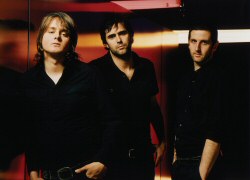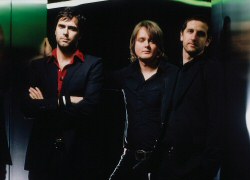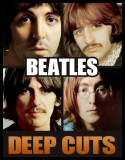
A chat with Richard Hughes of Keane
06/22/2006
Music Home / Entertainment Channel / Bullz-Eye Home
ALSO: Check out our review of the latest Keane album, Under the Iron Sea.
God, wouldn’t you hate to be Keane right about now? After pulling off what so few British bands can accomplish and scoring a sizable hit right out of the box with their debut album, Hopes and Fears, not to mention being nominated for a Grammy for Best New Artist, the pressure on them to produce a top-notch follow-up has got to have their nerves jangling. And, yet, when Bullz-Eye had the opportunity to speak with Keane’s drummer, Richard Hughes, only a day after their sophomore release, Under the Iron Sea, had come out in their native England, he seemed cool as a cucumber. Hughes was glad to discuss the new album, his thoughts on being compared to Coldplay, and how he almost needed an extra pair of trousers at the Grammy Awards.
Richard Hughes: Hi, Will, how are you?
Bullz-Eye: I am great. How are you?
RH: Not bad, thanks. Where are you in the world?
BE: I am in Chesapeake, Virginia, which is right next to Virginia Beach.
RH: Oh, that sounds nice!
BE: It’s not bad. I’ve been here all my life, so I’m pretty numb to it, but everyone says it’s very nice.
RH: (Laughs) Fair enough!
BE: Well, I’m a big fan of ya’ll. I’m one of the critics who actually paid for your first album…
RH: Wow! Well, thanks very much! You’re the one (person)!
BE: Well, I try…
RH: (Laughs)
BE: …though I can’t say the same for the new album, because they did overnight that to me, so I could hear it before I talked to you!
RH: Cool! Well, it isn’t out, so I’ll excuse you that.
BE: Why, thank you. Well, the first single (“Is It Any Wonder?”) I had already heard…which is great, by the way.
RH: Thank you very much.
BE: In a way, it almost seems to scream, “Who are you calling a one-trick pony?”
RH: A-ha-ha! Yeah, well, that’s interesting. I dunno. We certainly spent our lives looking up to bands, y’know, whether it’s the Beatles going from a boy band to changing the world, really, to Radiohead challenging their listeners with every album, we’ve always looked up to bands who were prepared to take risks and challenge themselves and try to do something different. I think the only thing we knew going into the studio was that we just didn’t want to make Hopes and Fears, Mk. 2.
BE: I definitely think the song, “Is It Any Wonder?”, has some U2 bombast…which is, I guess, not really a surprise, because I’ve heard that Achtung Baby is one of your favorite albums.
RH: It is, definitely, although I think Tim (Rice-Oxley, pianist) was trying to make his piano sound like it was played by Jimi Hendrix rather than the Edge…but, y’know, I guess the Edge was trying to sound like Jimi Hendrix, too, so I guess they both ended up sounding like they do. But it’s, y’know, I don’t know, it’s a three-minute rock song. And I guess some people probably thought we’d come out with twelve mid-paced ballads about forlorn love or something, but that’s just not who we are right now, and that’s not the record we made.
BE: “Nothing In My Way” has a wonderful chorus.
RH: Yeah, Tim’s pretty clever with the choruses and with the melodies, generally. It’s an exciting moment when he comes up with a new song and says, “Here, have a listen to this demo I’ve made of this new song.” And you just sort of think, “Wow! How exactly do you do that?” I don’t know where it comes from sometimes.
BE: And, actually, that leads right into my next question: how does the writing process go for the band? I mean, I know the songwriting credits are divided up equally, but does each person come in with an idea? Or, as you said, a demo is brought in, in some cases.
RH: Well, no, I mean, Tim writes the melodies and the words. I dunno when he finds the time to do it, actually. It seems like he’s already one of the world’s busiest people. I dunno, he’ll just write a song, and we’ll all come together and work on it and record it. Sometimes it’ll have a drum part on it, sometimes it won’t. Sometimes it’ll have words, sometimes it won’t, but he’ll come up with them eventually. But when we get into the studio…like, on this record, we were writing a lot of the parts as we went in the studio, whereas with the first record, we’d been practicing as a band for years without anyone caring, and most of the songs we could just go into the studio and just play them down. So, yeah, with this album, we definitely wrote…like, drum parts and things were being written on the day and came up with them as we went and really sort of experimented. Same with Tim and his piano lines and coming up with the different sounds for the record. He was definitely experimenting in the morning and recording in the evening, that kind of thing. It was a different process, but… (Pauses) Most of the songs were written before we went into the studio, but we hadn’t really had time to work on them because we’d been touring. There was a couple, like “Leaving So Soon,” which was written very late on in the recording process. That was worked on right at the end.
BE: Now, see, I think someone has slipped you my question sheet, because you’ve just answered my next question before I’ve even asked it.
RH: Oh, I’m sorry.
BE: No, it’s great.
RH: I should always read ahead. That’s what they tell you to do in school, but I never do.
BE: I was just going to recite the ever-quoted cliché about how you have a lifetime to write your debut album and then six months to write the follow-up.
RH: Well, you know, he was writing on the road quite a lot. I mean, we were aware of that pressure, and I think, as a result, the pressure did get to us for awhile. Especially Tim. He definitely felt under a lot of pressure to write new songs. Tom (Chaplin, lead singer) and I would go out and do a lot of the interviews during the day while we were on tour, so Tim could sit on the tour bus and write songs. But you just can’t sort of allocate two hours to writing a hit; it’s just not how it works. A lot of Hopes and Fears was written late at night after a glass of wine; he just sat in his house next to a piano, banging away, half-drunk, and coming up with a riff or whatever, without the pressure. And I think it did sort of contribute to our growing madness as we went ‘round the world, the amount of pressure on him. It’s not so much from the making-another-record point of view to follow up Hopes and Fears or anything. It’s just because…just from within us there was enough pressure. So that was a difficult time.
BE: “Put It Behind You” is…well, bouncy pop goodness, basically…
RH: Yeah!
BE: …but, then, right after the three-and-a-half-minute mark, it suddenly shifts into an instrumental that would’ve fit in on Moby’s Play album. Where did that come from?
RH: The instrumental is definitely, uh… (Chuckles) I dunno. There was a very sort of dark atmosphere in the studio while we were making the record, and it was something that we wanted to reflect through the sounds the piano was making. That sort of instrumental track almost marks the halfway point on the record. It’s…it’s actually a cheat! It’s weird. When you’re a band, you never know about this stuff until you get to release a record, but you have to have a… (Goes quiet) This is so boring.
BE: No, no.
RH: I can’t even believe I’m going to talk about it…but, like, from a wholesale point of view, the record companies in Europe want you to have one more track than the record company in America, so that the people in record shops don’t parallel-import stuff from America because it’s cheaper.
BE: And, of course, nothing infuriates the fans more.
RH: Precisely. Because it means that American fans are shortchanged. So the track listing in Europe has 12 songs on it, of which that instrumental that you’re talking about, after “Put It Behind You,” it’s actually a track called “The Iron Sea.” And in Europe, it’s a separate track. But we didn’t want to change the album for America, so we did was, we just tacked it on the end of “Put It Behind You” and didn’t declare it as a track, just as a way that we then didn’t have to change the album in America. I dunno, for all the marketing and record company things you have to put up with, we didn’t want to compromise the record we’d made, so that’s what we did. They insisted on something different, so we just said, “Just leave the name out and people will think there are only eleven tracks.” But, actually, there are twelve. So, yeah, that track, it’s just about getting that suffocating atmosphere that we were feeling in the studio onto record. Tim was just hammering away at the piano and he came up with this sound through experimenting with pedals and amplifiers. People seem to have this respect for the piano, that it’s this sort of classical instrument that you’re not allowed to fuck with, but we decided it was long overdue, and we tried to take the piano… (Adopts spooky voice) …where it had never been before. (Laughs) Or something like that. Something that doesn’t sound cheesy but means the same thing.
BE: Given how many bands arrive in the States and are immediately sent packing, how did you guys react when you started to realize, “Hey, they’re actually paying attention to us”?
RH: I dunno, I think we just felt that we wanted to do something in America. I mean, America gave the world rock ‘n’ roll music, and we have our twist on it that we wanted to see… (Pauses) As three guys from the countryside in the south of England, surrounded by greenery, the idea of touring America is just something that you’re not going to dissuade us of easily. It’s, like, I don’t care if no one wants to hear us; we’re going back! And we’ve done five tours, so I guess…I don’t know whether people like us or just want us to sort of have a big gig and then not come back, but it’s something we enjoy doing. You get a chance…I’ve seen more of America than probably most Americans will get to see, and that’s a pretty humbling thing to be able to say. And we do enjoy it, so it is nice to feel welcome. I know some English bands sort of give up, but they just need a bit of backbone, y’know? You’ve got to get through…things didn’t happen immediately for us – by any means – in the UK. We’ve been a band since we were 17…and to put it in perspective, I’m now 30! And we released our first album two years ago! So we’ve had to persevere. I dunno, we just have that thing where if you go to a town and the gig isn’t sold out, it just makes you want to go back and sell it out…rather than make you go, “Fuck you, I’m not coming back!”
BE: So how has success changed Richard Hughes? What was the first extravagance you bought after you got that first big royalty check?
RH: Well, I play the drums, so guess what…? It was a drum kit. For the recording of the first record, I went out and bought a really nice drum kit. And that was my first extravagance. I don’t think it’s changed me that much. The friends I had before we had an album out are the friends I have now. Like, yesterday, the album came out in the UK, but, actually, I didn’t have much to do, so I met some pals in the pub and we had a drink…and they were the same guys I was meeting for a drink long before Hopes and Fears came out…so I hope it hasn’t changed me. I mean, I have a nice flat in London which I live in, and that’s different, because I was still living at my mum and dad’s house at the age of 28 when Hopes and Fears came out, so that aspect of my life has changed. But I dunno, we’re still three friends, and if any of us get above our station, then the other two are there to slap us back down. I think that’s valuable, though. I think it’s a very valuable thing. Even though we kind of went through our darker times toward the middle of last year, I think we do have that, and it’s a very strong thing.
BE: When you didn’t win the Best New Artist Grammy, did you go, “Oh, whew, that means we have at least five more years of our career left”?
RH: Well, y’know, it was weird being on the green red carpet. We did have a lot of people ask us about the curse of the Best New Artist, and it does make you think, “Do we really want to win this one?” I dunno, we would’ve loved to get a Grammy or whatever, but it was such a bonus being nominated and asked to come. We weren’t…we didn’t even consider that there was a possibility that we would get nominated. We thought if we were going to get nominated for a Grammy, we would’ve been nominated the year before, when the album came out.
BE: You’d think that. I’ve never quite understood the Grammys.
 RH: Yeah, nor do I! I mean, Green Day won Best Album one year, and then Best Song for a song from the album the next year…which is great, because they’re an amazing band and they fully deserve to win Grammys for that record for the rest of their lives! It’s obviously a unique organization. It’s just cool; the fact that we were the only non-American band nominated in that category is amazing. It’s amazing to us to really feel like there are people in America who know about us and who like our music. I dunno, some people say they care about awards, some people say they don’t care about awards, but we’ve found it very exciting that there were people in America who cared about us enough to nominate us for this thing, even though John Legend was always going to win. And fair enough! It was just cool being there. Just sitting there in your seat with Beyonce’s mom and dad in front of you, watching Bono chat to Jay-Z, with Paul McCartney to your left and Linkin Park to your right. That’ll do me! I must admit, I nearly shat myself when I turned around and saw Dennis Hopper!
RH: Yeah, nor do I! I mean, Green Day won Best Album one year, and then Best Song for a song from the album the next year…which is great, because they’re an amazing band and they fully deserve to win Grammys for that record for the rest of their lives! It’s obviously a unique organization. It’s just cool; the fact that we were the only non-American band nominated in that category is amazing. It’s amazing to us to really feel like there are people in America who know about us and who like our music. I dunno, some people say they care about awards, some people say they don’t care about awards, but we’ve found it very exciting that there were people in America who cared about us enough to nominate us for this thing, even though John Legend was always going to win. And fair enough! It was just cool being there. Just sitting there in your seat with Beyonce’s mom and dad in front of you, watching Bono chat to Jay-Z, with Paul McCartney to your left and Linkin Park to your right. That’ll do me! I must admit, I nearly shat myself when I turned around and saw Dennis Hopper!
BE: (Laughs loudly)
RH: It’s, like, fucking hell! What a guy! Just to see him in the flesh was great. And then we went to the U2 after-show party, and that was quite a star-spangled event…so, yeah, that was fun.
BE: Since you’re a former “next big thing” in the British press…
RH: (Bursts into laughter)
BE: …have you ever seen a band trumpeted by NME or Q or whoever and just said, “Oh, give me a break”?
RH: Oh, God, I dunno. There are so many bands that are the next big thing. I think in a way we probably feel slightly sorry for them for that tag. To be honest, we never got…we had the odd thing, but NME have never liked us…
BE: …which has apparently worked on your favor.
RH: Well, yeah, and that’s what I was going to go on and say. Sometimes, they’ll just fix on a band and decide to put them on the cover, week in and week out, before an album has come out or anything, and you just think, this is so much pressure on sometimes very young shoulders. And you just want them to kind of give bands time. I mean, look at R.E.M. or someone. They put out, what, five albums on I.R.S. before the world really, really fell at their feet. That gave them time to find their way as a band. The Arctic Monkeys, I guess, are an exception, but the NME are always putting them on the cover…and they’re a great band, so they deserve it, but if they weren’t such a great band, then the pressure would probably be so great that they’d have no chance. It’s a weird world.
Interscope Rep: Hey, guys, we need to wrap it up.
BE: Okay, one last one, and then I’m done.
RH: Okay.
BE: And this one was actually gonna be my final one, anyway: could you be any more sick of the lazy comparisons to Coldplay?
RH: (Takes a deep breath) Ah, it’s just nice having another record out. Hopes and Fears was one part of Keane, and this new record is showing another side to us. I dunno, it’s always inevitable. I have a copy of an old magazine called Vox, the monthly NME thing, and the cover of it says, “Radiohead: The New U2?” Y’know? So fuck comparisons.
BE: And I can’t think of a better closing line than that.
RH: (Laughs) Thanks a lot!








